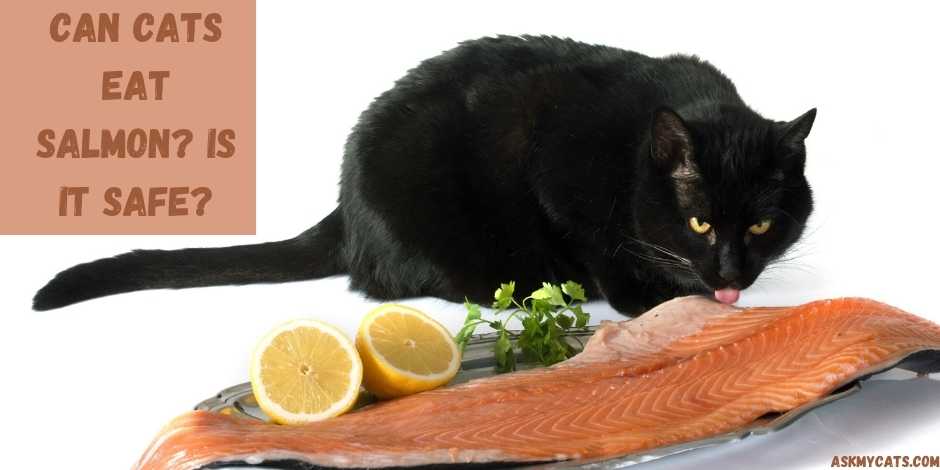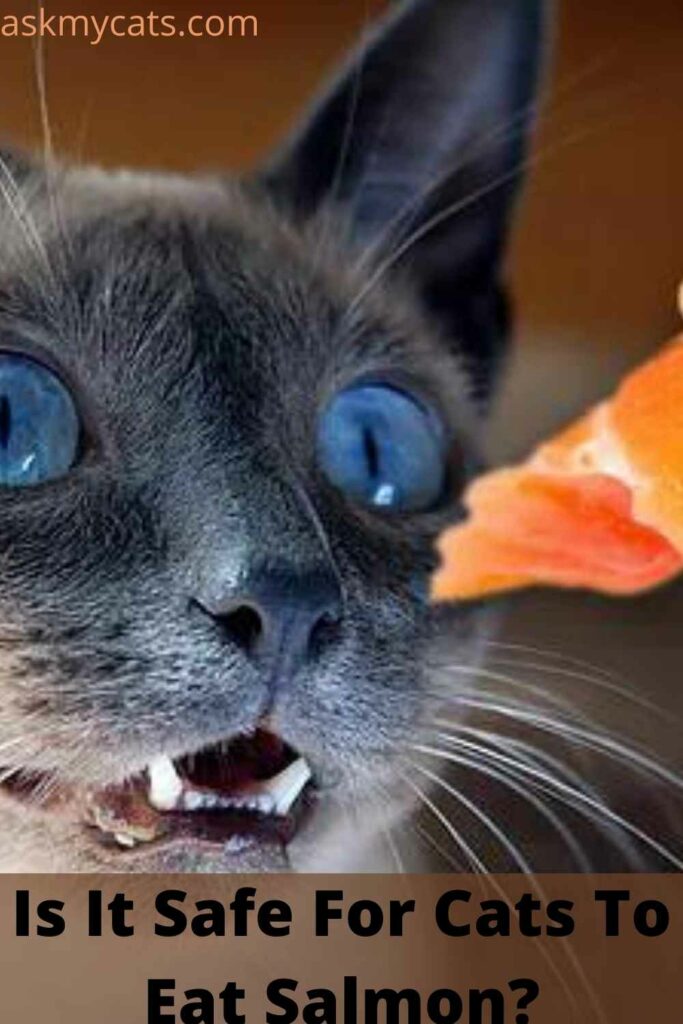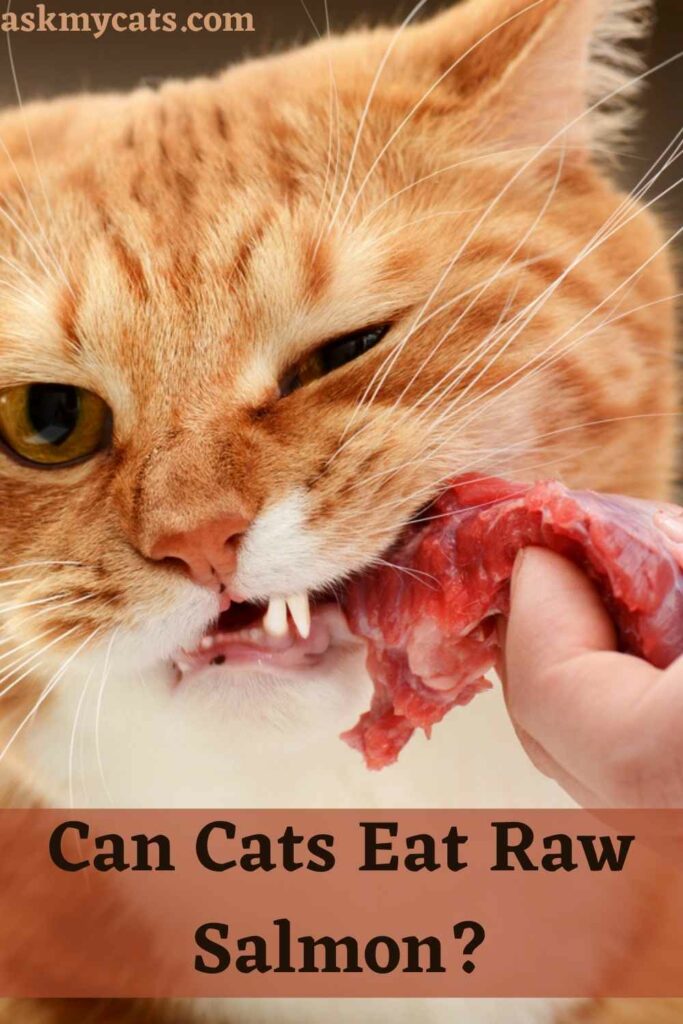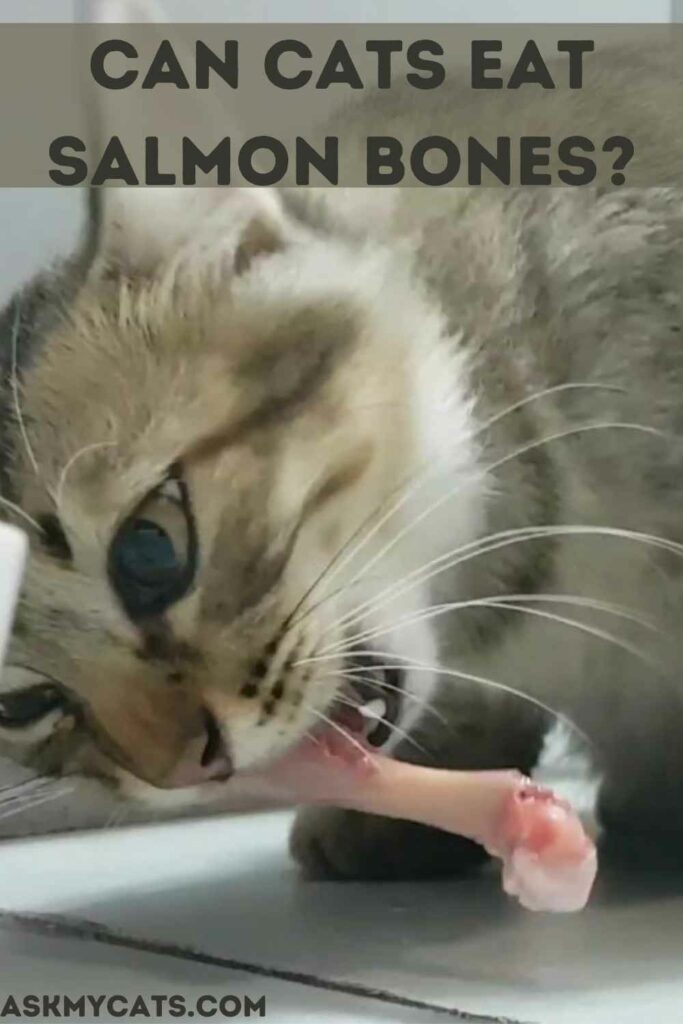Salmon is a nutritious meal that is high in protein, has a variety of vitamins and minerals, and contains a general serving of omega-3 and omega-6 fatty acids. So, can cats eat salmon?
Yes, cats can surely eat salmon, and it is also safe if consumed in moderation. Salmon must not replace the cat’s natural diet.
Keep reading this article and by the end of it you will know all the pros and cons of feeding salmon to your cat.


Give Your Cat the Perfect Day
Get the Free Ebook!
Is It Safe For Cats To Eat Salmon?
Yes, it is safe for cats to eat salmon, just make sure that salmon does not replace your cat’s main diet.

Salmon is another type of fish that is high in protein, omega 3 fatty acids, and nutrients that are beneficial to cats, but it should not be the primary source of protein in your cat’s diet.
Salmon can cause cats to grow addicted to them, and they may begin to shun their regular meal in favor of these more exotic delights.
As a result, salmon should only be given as a special treat to your cat.
How you prepare salmon for your cat is also important.
The nutritional value of salmon that has been deep-fried or cooked at a high temperature is likely to be diminished.
Salmon that has been roasted, grilled, or poached is a healthier option for your cat.
Seasonings, sauces, and other substances that are poisonous to cats should never be added to the salmon.
It’s also vital not to feed canned, smoked, or cured salmon to your cat because these foods contain high quantities of salt, which can be harmful to cats and can cause death.
If you suspect your cat has eaten this type of fish, get them to a veterinarian right away.
How Much Salmon Should Be Fed To A Cat?
A good salmon cat treat for a 10-pound cat should be around 30 calories, which, would be one-tenth of a half-fillet.
For a cat who eats a lot of food, it’s easy to go overboard with these fish snacks.
Cats can develop accustomed to grilled salmon, according to veterinarians, and may begin to eat less of their regular balanced meal in favor of your fishy treats.
So, cook your salmon safely, serve it in small pieces, give it as a treat to your cat, and watch it become super happy after eating it.
Can Cats Eat Salmon Everyday?
No, cats should not be fed salmon every day as it lacks all the nutrients required for a healthy cat and your cat can become addicted to it refusing their normal meal.
Salmon should only ever be given to your cat as a snack on occasion because cats can become addicted to it and may begin to simply deny their regular food in pursuit of these more luxurious treats.
Although salmon is another type of fish that contains plenty of protein, omega 3 fatty acids, and nutrients that are beneficial to cats, it should not be the primary source of protein in your cat’s diet.
Can Cats Eat Raw Salmon?
Yes, cats can eat raw Salmon but that doesn’t mean that they should. According to experts cooked salmon is preferred to avoid gastrointestinal upset.

“To avoid gastrointestinal discomfort, cooked salmon is better than raw salmon,” doctors say.
Salmon Poisoning Disease is a risk for cats who consume raw salmon and other seafood, according to experts.
“It’s from raw salmon contaminated with Neorickettsia helminthoeca bacteria and Nanophyetus salmincola fluke,” they explained. “However, most cats appear to be resistant.”
However, just because most cats aren’t affected by this sickness doesn’t mean that raw salmon and other meat aren’t dangerous to them.
The American Animal Hospital Association issued a statement opposing raw food diets for cats, with the support of the Association of American Feline Practitioners:
The statement reads, “Homemade raw food diets are dangerous since retail meats for human consumption can be tainted with germs.”
“Many of the diseases discovered in raw protein diets can be transmitted to humans by contact with the food, pets, or surfaces in the environment.
Many of these species have also been found to be resistant to multiple antimicrobials, which is alarming.”
Can Cats Eat Smoked Salmon?
Yes, cats can eat smoked salmon, but in small portions as a treat and not as a regular diet.
Smoked salmon can be eaten by cats, but it should not be their primary source of nutrition.
Some people are concerned about the high salt content, probable heavy metals, spices, and excessive fat content, which could be detrimental to cats if given in big numbers.
However, the nutritional benefits may make feeding your cat worthwhile.
Smoked salmon is a delicacy that many people appreciate. Curing the salmon, which converts it into lox, is the first stage in making smoked salmon, followed by either a hot or cold smoking process.
Omega 3 fatty acids are abundant in smoked salmon. These good fats can help with heart health, brain function, and may even have anti-inflammatory properties.
Because of its high sodium content, high-fat content, and potential for containing heavy metals, some pet owners are afraid to feed smoked salmon to their cats.
You should be fine as long as you feed your cat a small quantity now and again, read the nutrition label, and discuss any concerns with your veterinarian.
Smoked salmon does have a high salt content. Fish is safe for cats to eat in moderation, and a little additional sodium may help your cat drink more water.
Salmon has 130 mg of sodium per cubic inch, which is around three times the daily limit for cats.
Researchers tell us that this amount consumed in one day does not affect healthy cats. Actually, a little extra sodium may encourage your cat to drink more water, which may help to prevent UTIs, which are prevalent in cats.
If you’re concerned about your cat getting too much sodium, but you still want to feed them smoked salmon, look for a brand that uses less sodium or prepare your own smoked salmon.
Can Cats Eat Salmon Skin?
Yes, cats can eat salmon skin but only it is cooked as it is not toxic for them. However, they should be given in moderation only.
When eating salmon, most people do not eat the skin. Salmon skin, on the other hand, is regarded safe to consume for both you and your cat and includes more of the same nutrients and minerals found in salmon, according to experts.
Salmon is a good source of omega-3 fatty acids, healthful fats, fish oils, vitamin B12, B6, potassium, selenium, and a variety of other minerals and nutrients. It’s one of the healthiest fish you can feed your cat, and it’s high in quality nutrition.
Can Cats Eat Raw Salmon Skin?
No, cats should never eat raw salmon skin as it is likely to be contaminated which can cause several health problems to your cat.
Cats should never consume raw fish, despite what you might see on TV or in illustrations.
Of course, wild cats consume raw fish. They will consume practically any living prey that comes within reach of their claws. Domestic cats, on the other hand, are a different story. Plus, store-bought raw fish isn’t the same as freshly caught fish.
The main problem is that raw fish is more likely to contain salmonella, E. coli, and other parasitic infections. Raw fish also contains enzymes that degrade some vitamins and nutrients that cats might benefit from when cooked.
This is also true with fish skin. Do not offer a fish to your cat if you want to skin it before cooking it. If you want to feed the skin to your cat, you need to cook it separately.
Cooking a piece of salmon without any oils, seasonings, or other ingredients is the ideal way to give your cat some skin. Then, as you serve the salmon, slice off the skin, let it cool, and send it over.
Can Cats Eat Salmon Bones?
No, cats must not be given salmon bones as it is a choking hazard and can even cause internal damage.

Salmon bones can be consumed by cats, but they shouldn’t. It makes no difference whether the bones are cooked or raw.
They can be a choking hazard, cause digestive system impaction, and cause internal injury.
The bones may cause more injury to the throat if the cat tries to regurgitate them. Cats may eat fish if the bones are removed.
Cooked fish is the only type of fish that should be served to cats. Cats should only be fed fish on rare occasions because it is not sustainable food for them.
Fish are deficient in thiamine, which cats require to survive. Thiaminase, which aggressively breaks down thiamine in the cat’s body, is also found in raw fish.
Cooked and raw fish bones can cause choking. Internal obstructions can also occur, necessitating surgery to clear.
When fish bones are cooked, they stiffen and become less bendable, increasing the risk of choking. Raw bones are still dangerous because of their needle-like shape, size, and quantity.
Any bones that enter through the stomach can injure the gastrointestinal tract further down. Any bones that stay in the stomach can be regurgitated, putting the person at risk of choking again.
Can Cats Eat Canned Salmon?
Canned salmon should be avoided for the most part to give to your cat as it contains salt in great amounts which are bad for the cat’s health.
Vitamins are in limited supply in canned salmon. It also contains a wide range of stabilizers and chemicals, such as salt, that are harmful to cats.
While your cat will enjoy a fish-based diet, the solid salmon and tuna base will not provide the nutrition and health benefits that a varied, well-balanced diet of various types of dry and canned cat food will.
Of course, you can always give your pet extra vitamins and supplements, but they’ll never be able to substitute a well-balanced food.
Things To Keep In Mind When Feeding A Cat Salmon
There are 3 things to keep in mind when feeding a cat salmon: –
- The first is that, no matter how nutritious, “human” foods must only be offered to our cats in moderation. At least 90% of a cat’s diet should be made up of designed foods, such as wet and dry cat food. These give them all of the nutrients they require.
- The second difficulty with an over-treating kitten is that they might become obstinate in their demands for rewards. And will keep pestering you all day for salmon skin or anything else for that matter. They might deny eating their normal diet, in hopes of getting salmon.
- The quality of the salmon is the third point to consider when feeding salmon or salmon skin to cats. Canned salmon, for example, is not as healthful as fresh salmon. Salmon in cans has a higher salt concentration in order to keep it fresh for longer.
Frequently Asked Question
Are salmon oil supplements safe for cats?
Ans. Yes, cats can be given salmon oil supplements but only after the approval of the vet as your cat’s veterinarian may be aware of an underlying medical issue that makes a particular supplement a potential source of unbalanced nutrition for your cat.
Can cats eat sardines?
Yes, cats can eat sardines. Sardines are tiny fish that might be a tasty treat for your cat. They contain protein, vitamin B12, and omega 3 fatty acids, all of which are beneficial to your cat’s health. Sardines, like tuna and salmon, should only be fed on rare occasions.
Which fish is best for cats?
Fish tinned in water with no bones are the greatest choice for cats. Make sure your fish, such as swordfish and king mackerel, aren’t high in heavy metals. Pollock is also a favorite of cats. Just make sure you don’t give your cat fish if they’re allergic to it, and don’t give it to them on a regular basis.
Final Words
To summarise, cats may eat salmon and enjoy it, but eating too much of it can be detrimental in the long run. Therefore, use these fish as only occasional treats.
Salmon should not be given to your cat on a regular basis; otherwise, it will become addicted to it and refuse to eat anything else.
For any other questions, keep it right here at askmycats.com.

It is imperative you ask your vet about the same. However, when I feed my cat, I tend to buy products that have smoked salmon in them. I prefer to buy my cat’s food from trusted places like PetCareRx and PetSmart.